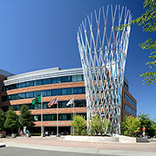Driving discovery where it’s needed most.
As researchers accelerate the pace of discovery — and navigate an increasingly challenging funding landscape — your support is more powerful than ever.
Our scientists and specialists are pursuing breakthroughs in cancer and infectious disease research, fundamental science, training and education, and more. A gift to advance our highest priorities fuels research, helps families facing cancer and related diseases, and honors patients everywhere who benefit from our work.

"There's no greater reward than providing and prolonging human life and ending suffering. Philanthropy gives Fred Hutch the freedom to experiment, to look around the corners at other ways of approaching this disease.”
— Mark Fleischauer, Fred Hutch supporter
Fred Hutch researchers are uncovering new insights about variables that can affect an individual’s cancer risk and response to treatment. You can help them transform this ever-expanding ocean of data into more effective treatments, diagnostic tools, and cancer prevention strategies tailored to individuals.
Through the Anniversary Challenge, which celebrates Fred Hutch’s first 50 years of discoveries, your generous gift of $1 million or more — to support our research environment; enable and advance immunotherapy, precision oncology, and virus and vaccine research; or empower our extraordinary faculty — will be matched by the Bezos family’s landmark 2022 gift.
Contact philanthropy@fredhutch.org to learn more about the Anniversary Challenge.

Since developing bone marrow transplantation in the 1970s, Fred Hutch scientists have been at the forefront of new methods for equipping the immune system to target cancer without harming healthy cells. We’re still discovering new ways to tap into the body’s inherent disease-fighting power, and donors are critical to accelerating development of the next wave of enduring immune-based therapies.

Advances in screening and treatment continue to drive down rates of cancer deaths in the U.S. But as the population grows and ages, the sheer number of people living with cancer is rising. But as the population grows and ages, the sheer number of people living with cancer is rising. Philanthropic gifts fuel research in specific disease areas, like breast, prostate, gastrointestinal, and blood cancers, and help ensure the best possible experience for everyone who comes to us for care.

The financial and logistical burdens of cancer can quickly become overwhelming for patients and their loved ones. Donor support helps families facing cancer secure temporary housing and cope with other barriers that can make it difficult to visit Fred Hutch, participate in clinical trials, and get the care they need.

Fred Hutch scientists are expanding what’s known about the fundamentals of life. We continuously ask questions about how normal cells function and how disruptions cause cancer and other diseases. And the answers we find — for example, how a protein’s shape can influence cancer growth — fuel translational research with benefits for patients everywhere. Donor support makes it possible for us to ask questions about health and disease that no one else asks, or even thinks to ask.

Our researchers work to ensure that everyone who needs care for cancer and other diseases can access it. Philanthropy is critical to developing and strengthening research and community partnerships that will improve prevention, screening, early diagnosis, and care, as well as improve individuals’ access to clinical trials that can benefit them and future patients.

Our immersive education programs connect trainees at every step of the academic journey with mentors at the top of their fields in scientific, data-focused, and research-adjacent careers, creating pathways to science that are open to all. Donor support for our outstanding educational opportunities stokes dreams, strengthens science and care, and puts students on the path to a lifetime of discovery.

Creativity and innovation thrive when researchers have resources, time, and freedom to pursue their ideas. That’s why we provide an unparalleled array of shared research resources, invest in emerging technologies and equipment, and foster a collaborative and open community. Donors who contribute to this priority foster a unique environment where people share ideas, science builds on science, and researchers take risks.

Unrestricted gifts allow us to quickly respond to new opportunities and pursue high-risk ideas that could lead to breakthroughs. Flexible funding is also essential to providing the space, resources, and stability our teams need to advance science and care standards. From streamlining faculty recruitment to enhancing supportive care for patients, gifts toward greatest needs fuel mission-critical activities that help us pursue scientific breakthroughs and healthier lives for every person in every community.

Partner with us
Gifts of all sizes help Fred Hutch turn innovation into action and strengthen our pursuit of healthier lives for every person in every community. If you’re interested in supporting any of our top priorities, we welcome the opportunity to share more details and partner with you to deliver a future beyond cancer and infectious disease.

“It's actually the risky projects which have the bigger chance of completely changing paradigms. Multiple labs at the Hutch are changing textbook definitions about what we know about biology, and that's bound to have a profound impact on how we understand life and how we practice medicine.”
— Harmit Malik, PhD, professor and associate director, Basic Sciences Division, Howard Hughes Medical Institute investigator
